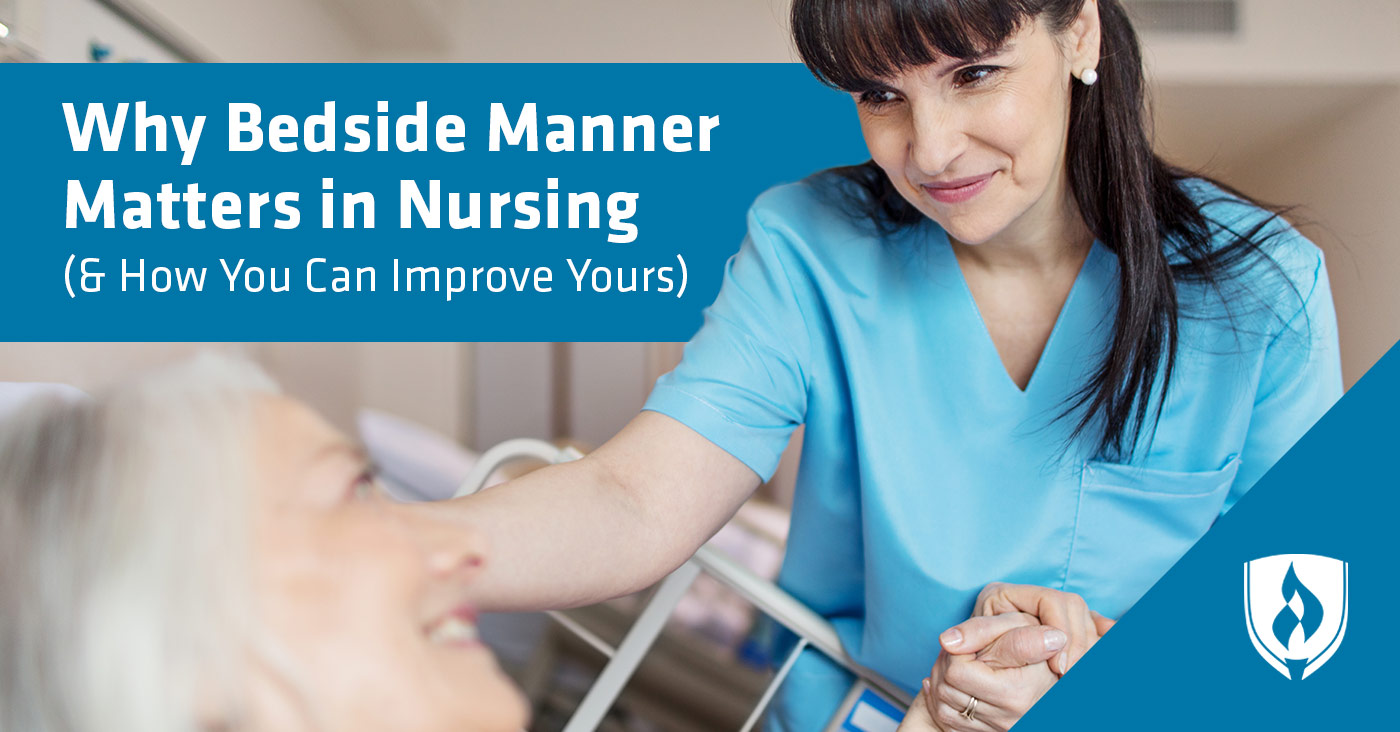
You work hard in Nursing school to master a huge variety of technical tasks and treatments. But a high GPA and by-the-book knowledge isn’t all it takes to be an excellent nurse.
While it seems obvious that successful nurses are experts in the field of medicine, technical knowledge is no substitute for a nurse’s relationship with their patients. In fact, the personal connections between patients and nurses are absolutely crucial in a patient’s road to recovery. These interactions are often referred to as “bedside manners.” Read on to find out what experts in the nursing field have to say about the importance of bedside manner.
Get Your Nursing School Questions Answered at a Nursing Information Session
What is bedside manner?
Simply put, bedside manner is the way in which nurses or other medical professionals interact and communicate with their patients. A nurse with a good bedside manner will have a strong and caring connection with all of his or her patients.
“Good bedside manner is about respect for the patient and their humanity—no matter how limited they may be due to aging, illness or disability; permanent or temporary. Focusing on your bedside manner takes a bit more time but reaps significant rewards,” says Faith Moore, the mother and caregiver of a son with extremely debilitating medical issues.
Complete mastery of medical knowledge could mean nothing for a nurse if they do not have the ability to make patients feel respected and valued.
How can I improve my bedside manner?
Stating that patients should feel valued and respected is simple enough, but what does that look like in the chaotic and often stressful day of a nurse? How can you incorporate this crucial element of nursing into your already packed routine? If you are already off to a strong start in connecting with your patients, how can you build on your current success to become even better? Keep the following in mind if you’d like to continue developing your bedside manner.
1. Keep the screens at bay
It’s hard to overstate the value technology has brought to healthcare. It enables us to store and analyze patient data, perform complicated surgeries and communicate efficiently with coworkers and patients. However, this wonderful technology can get in the way of making that crucial human connection.
Kelly Elder, a family nurse practitioner who has been in the field of nursing for 20 years, explains the importance of avoiding looking at your watch, answering phone calls and text messages or staring at your computer screen when interacting with your patient. Patients will notice if you are caught up in distractions instead of giving them your full attention. Take a moment to put all of that aside and speak directly to the patient.
2. Take time to listen AND explain
It is easy and natural for nurses with extensive knowledge and years of experience to do the majority of the talking during interactions with patients or even focus on quick administration of medical procedures without regard to the patient in the room. After all, you know what you’re doing, and it’s more efficient to just get the job done.
Elder emphasizes taking time to pay full attention to a patient’s complaint or concerns instead of assuming you already know. Rather than going through the motions as quickly as possible, explain the procedures to your patients before completing them. This will make your patient feel valued and alleviate some of the anxiety people have about medical procedures.
3. Be aware of your body language
Most patients are not coming to the clinic with an educational background in medicine. Medical language and instruments are very often foreign and sometimes intimidating to the point that people would rather just not schedule their checkups.
Elder explains your body language could make this effect even worse. “Avoid authoritative body language such as standing over the patient, pointing your finger and exhibiting a defensive posture.” Instead, get on the same level as your patient whether it is sitting or standing. Maintain eye contact, especially when a patient is explaining something to you. These seemingly simple adjustments can make or break trust with a patient.
4. Use common courtesy
Healthcare is such a personal experience for individuals, and the initial step to building trust often lies in first impressions. Upon meeting a patient, “Introduce yourself so they know who is taking care of them. Patients like calling their nurses by name,” says veteran nurse Eileen Sollars.
Sollars encourages nurses to ask patients how they would prefer to be addressed, and not to assume they want a stranger calling them by their first name. She also suggests announcing yourself every time you enter the room by knocking on the door. This gives the patient a sense of privacy and respect in what are very often vulnerable situations.
5. Observe and ask questions
As a nurse, you understand how diverse your patient population is. Each patient carries different health experiences with them into every interaction with a medical professional. You are trained to observe and analyze medical symptoms, and you can also use those observational skills to understand what your patient’s body language tells you about their feelings. Are they nervous, angry, happy or curious about the experience? How can you adjust your interaction based on these observations?
“The best nurses were the ones who asked me if they needed to be aware of anything before they started care. When you ask if there is a routine or an optimal way to give a med or do a treatment, that moment can help you avoid an issue and inspire rapport with your patient.” Moore explains how nurses connect by adjusting to a patient’s norms rather than expecting the patient to accommodate the diverse habits of myriad nurses they will encounter.
6. Keep it simple
It’s fantastic to have in-depth medical knowledge of a procedure or ailment, but your goal is not to impress patients with the number five-syllable words you can rattle off in an explanation. Do your best to keep your conversations in plain language—patients will better understand what is going on and will spend less time racking their brains trying to decipher the meaning of some obscure medical term. You can always add more detail to your explanation later on as patients ask for it.
Master your bedside manners
Effective nurses are so much more than just automatons capable of regurgitating treatment information and performing technical nursing tasks. The best have excellent bedside manner and know almost intuitively how to make a patient feel at ease with how they carry themselves. So are your bedside manners lacking? By following the advice above, you’ll be on your way to becoming a more well-rounded healthcare professional.
That said, sometimes no matter how intentional you are about improving your bedside manner, you may still come across some patients who test your patience. For advice on how to approach these tough situations, check out our article, “10 Terrific Tips for New Nurses Dealing with Difficult Patients.”
Related Articles:




